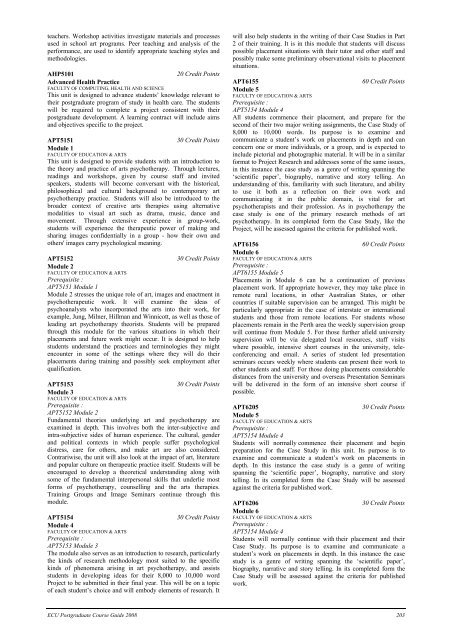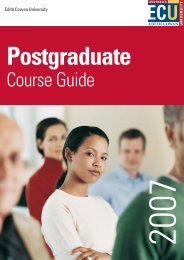Postgraduate - Edith Cowan University
Postgraduate - Edith Cowan University
Postgraduate - Edith Cowan University
You also want an ePaper? Increase the reach of your titles
YUMPU automatically turns print PDFs into web optimized ePapers that Google loves.
teachers. Workshop activities investigate materials and processes<br />
used in school art programs. Peer teaching and analysis of the<br />
performance, are used to identify appropriate teaching styles and<br />
methodologies.<br />
AHP5101 20 Credit Points<br />
Advanced Health Practice<br />
FACULTY OF COMPUTING, HEALTH AND SCIENCE<br />
This unit is designed to advance students’ knowledge relevant to<br />
their postgraduate program of study in health care. The students<br />
will be required to complete a project consistent with their<br />
postgraduate development. A learning contract will include aims<br />
and objectives specific to the project.<br />
APT5151 30 Credit Points<br />
Module 1<br />
FACULTY OF EDUCATION & ARTS<br />
This unit is designed to provide students with an introduction to<br />
the theory and practice of arts psychotherapy. Through lectures,<br />
readings and workshops, given by course staff and invited<br />
speakers, students will become conversant with the historical,<br />
philosophical and cultural background to contemporary art<br />
psychotherapy practice. Students will also be introduced to the<br />
broader context of creative arts therapies using alternative<br />
modalities to visual art such as drama, music, dance and<br />
movement. Through extensive experience in group-work,<br />
students will experience the therapeutic power of making and<br />
sharing images confidentially in a group - how their own and<br />
others' images carry psychological meaning.<br />
APT5152 30 Credit Points<br />
Module 2<br />
FACULTY OF EDUCATION & ARTS<br />
Prerequisite :<br />
APT5151 Module 1<br />
Module 2 stresses the unique role of art, images and enactment in<br />
psychotherapeutic work. It will examine the ideas of<br />
psychoanalysts who incorporated the arts into their work, for<br />
example, Jung, Milner, Hillman and Winnicott, as well as those of<br />
leading art psychotherapy theorists. Students will be prepared<br />
through this module for the various situations in which their<br />
placements and future work might occur. It is designed to help<br />
students understand the practices and terminologies they might<br />
encounter in some of the settings where they will do their<br />
placements during training and possibly seek employment after<br />
qualification.<br />
APT5153 30 Credit Points<br />
Module 3<br />
FACULTY OF EDUCATION & ARTS<br />
Prerequisite :<br />
APT5152 Module 2<br />
Fundamental theories underlying art and psychotherapy are<br />
examined in depth. This involves both the inter-subjective and<br />
intra-subjective sides of human experience. The cultural, gender<br />
and political contexts in which people suffer psychological<br />
distress, care for others, and make art are also considered.<br />
Contrariwise, the unit will also look at the impact of art, literature<br />
and popular culture on therapeutic practice itself. Students will be<br />
encouraged to develop a theoretical understanding along with<br />
some of the fundamental interpersonal skills that underlie most<br />
forms of psychotherapy, counselling and the arts therapies.<br />
Training Groups and Image Seminars continue through this<br />
module.<br />
APT5154 30 Credit Points<br />
Module 4<br />
FACULTY OF EDUCATION & ARTS<br />
Prerequisite :<br />
APT5153 Module 3<br />
The module also serves as an introduction to research, particularly<br />
the kinds of research methodology most suited to the specific<br />
kinds of phenomena arising in art psychotherapy, and assists<br />
students in developing ideas for their 8,000 to 10,000 word<br />
Project to be submitted in their final year. This will be on a topic<br />
of each student’s choice and will embody elements of research. It<br />
will also help students in the writing of their Case Studies in Part<br />
2 of their training. It is in this module that students will discuss<br />
possible placement situations with their tutor and other staff and<br />
possibly make some preliminary observational visits to placement<br />
situations.<br />
APT6155 60 Credit Points<br />
Module 5<br />
FACULTY OF EDUCATION & ARTS<br />
Prerequisite :<br />
APT5154 Module 4<br />
All students commence their placement, and prepare for the<br />
second of their two major writing assignments, the Case Study of<br />
8,000 to 10,000 words. Its purpose is to examine and<br />
communicate a student’s work on placements in depth and can<br />
concern one or more individuals, or a group, and is expected to<br />
include pictorial and photographic material. It will be in a similar<br />
format to Project Research and addresses some of the same issues,<br />
in this instance the case study as a genre of writing spanning the<br />
‘scientific paper’, biography, narrative and story telling. An<br />
understanding of this, familiarity with such literature, and ability<br />
to use it both as a reflection on their own work and<br />
communicating it in the public domain, is vital for art<br />
psychotherapists and their profession. As in psychotherapy the<br />
case study is one of the primary research methods of art<br />
psychotherapy. In its completed form the Case Study, like the<br />
Project, will be assessed against the criteria for published work.<br />
APT6156 60 Credit Points<br />
Module 6<br />
FACULTY OF EDUCATION & ARTS<br />
Prerequisite :<br />
APT6155 Module 5<br />
Placements in Module 6 can be a continuation of previous<br />
placement work. If appropriate however, they may take place in<br />
remote rural locations, in other Australian States, or other<br />
countries if suitable supervision can be arranged. This might be<br />
particularly appropriate in the case of interstate or international<br />
students and those from remote locations. For students whose<br />
placements remain in the Perth area the weekly supervision group<br />
will continue from Module 5. For those further afield university<br />
supervision will be via delegated local resources, staff visits<br />
where possible, intensive short courses in the university, teleconferencing<br />
and email. A series of student led presentation<br />
seminars occurs weekly where students can present their work to<br />
other students and staff. For those doing placements considerable<br />
distances from the university and overseas Presentation Seminars<br />
will be delivered in the form of an intensive short course if<br />
possible.<br />
APT6205 30 Credit Points<br />
Module 5<br />
FACULTY OF EDUCATION & ARTS<br />
Prerequisite :<br />
APT5154 Module 4<br />
Students will normally commence their placement and begin<br />
preparation for the Case Study in this unit. Its purpose is to<br />
examine and communicate a student’s work on placements in<br />
depth. In this instance the case study is a genre of writing<br />
spanning the ‘scientific paper’, biography, narrative and story<br />
telling. In its completed form the Case Study will be assessed<br />
against the criteria for published work.<br />
APT6206 30 Credit Points<br />
Module 6<br />
FACULTY OF EDUCATION & ARTS<br />
Prerequisite :<br />
APT5154 Module 4<br />
Students will normally continue with their placement and their<br />
Case Study. Its purpose is to examine and communicate a<br />
student’s work on placements in depth. In this instance the case<br />
study is a genre of writing spanning the ‘scientific paper’,<br />
biography, narrative and story telling. In its completed form the<br />
Case Study will be assessed against the criteria for published<br />
work.<br />
ECU <strong>Postgraduate</strong> Course Guide 2008 203



